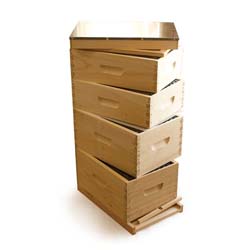Anyone interested in beekeeping learns quickly that honeybees are awesome, fascinating creatures, and then gets hooked on learning as much as they can! While many view beekeeping as a fun hobby or a means to obtain honey, beekeeping significantly impacts the world around us. Being a good beekeeper means learning to think like a bee and understand their behaviors by building a foundation of knowledge around what they need.
Before you officially bring home and install your first honeybee colony, it’s crucial to start building that knowledge. You can do this in many ways, but some great options are taking some beekeeping courses, either online or in-person through your local beekeeping club, pick out a few beginner beekeeping books* to add to your bookshelf, and seek to understand integral topics that will affect your hobby, like the biology and anatomy of honeybees, their reproduction and lifecycles, and the role of each honeybee in a hive (worker, queen, and drone).
*(Check out some of our favorite beekeeping books for beginners in the “Read More” section below!)
It’s also important to note that as fun as this hobby is, beekeeping does require a fair amount of work and commitment (keep in mind that in some places, permission is legally required to have bees, too). To ensure your honeybee colony stays as healthy as possible, you’ll need to complete regular beehive inspections and trips to the bee yard to monitor their health. But with a plan for the season ahead and by taking notes during each beehive inspection, monitoring your bees’ health and understanding the threats they face will make beekeeping tasks much easier!
Beekeeping requires not just effort to be successful, but also some pretty unique equipment. In addition to choosing your beehive setup and the bees themselves, you’ll want to consider the other tools you may need, like feeders and smokers, and of course, the specialized protective clothing to keep you safe as you work (especially if you or your kids may have a bee sting allergy). Having the right tools and knowing how and when to use them, before getting started in the Spring, can make all the difference in helping you to complete beekeeping tasks successfully and efficiently.
Beekeeping isn’t just about harvesting honey or supporting pollination efforts, it’s about caring for creatures that impact entire ecosystems and food sources worldwide. If you let them, your bees can teach you quite a lot about the world far beyond their hive, and about resilience and patience, too. Before getting started, making sure you understand how to be a responsible beekeeper can make a huge difference in not just the success of your hobby but in helping honeybee populations for generations.
Read More
Questions for New Beekeepers to Answer First
A Practical Guide to Starting Beekeeping
Involving Family and Friends in Beekeeping
A Practical Guide to a Thriving Colony
Contrarian Positions for New Beekeepers to Consider *
Thoughts on Responsible Beekeeping *
Myths for the New Beekeeper to Question *
* Colony Member-Only Content
Related Products in the PerfectBee Store
Whether you’re just getting started preparing for your first season of beekeeping or starting fresh by replacing old equipment (or holey clothing!), the PerfectBee Store has you covered!
Complete Beehive Kits & Bundles
Beekeeping Tools & Accessories
Protective Beekeeping Clothing
Awesome Beekeeping Books for Beginners in the PerfectBee Store
The Backyard Beekeeper 4th Ed.
